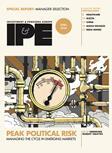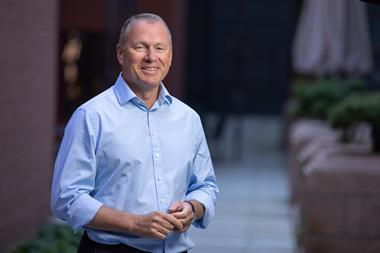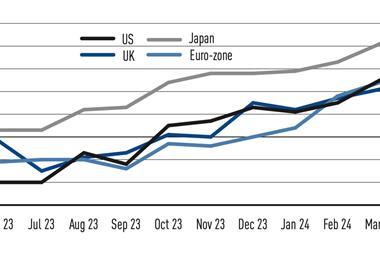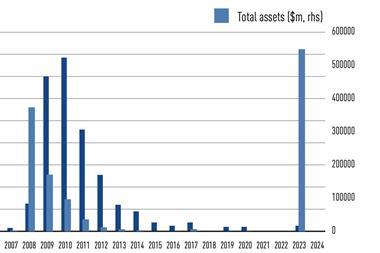There are two distinct pushes for a crossborder pension administration product emerging in Europe. One is coming from the multinationals who are searching for a common pension fund and consequently pressing higher demands on their custodians to come up with an efficient and unified cross-border administrative system. The other is coming from third-party service providers who are paying immediate attention to mu-tual funds, but who will have the systems and products in place to greet the defined contribution (DC) market when it arrives and might just beat the custodians to the winning line.
What is certain is that over the next few years players that have a dominant presence in the custody market will become fewer and far between in the administrative servicing sector.
First BIL is one of a handful of European organisations making the first real steps into realising a pan-European pension administration product. A Dublin operation was opened up earlier this year to be followed by offices in Brussels and Paris by year-end, with plans for Germany and London under way for the first quarter of 1998. And undoubtedly, over the next couple of years, the rest of Europe will follow. William Reed, CEO sees this as preparing for the inevitable: In a few years time, you're going to have truly international service providers to fund groups. If you look at it today, who internationally services fund groups? It's basically just banks. If you say banks, that means the access is in the custody function - that isn't our interest. Ours is everything but the custody function. Ours is the servicing arm and it is very rare to find somebody that services funds around the world and that's what we are trying to do."
While First BIL is targeting the retail fund market, it has recently bought the European rights to a product which is far more applicable to institutions.
The Hub and Spoke mechanism, originated by Signature in the US, is similar in principle to Credit Agricole Indosuez's cloning product, and will appeal to multinationals which can justify investing large sums of money into a fund which can be semi-replicated cross-border.
The steps made so far by First BIL have been restricted to the mutual fund arena, but it is this that will be relevant come the move to DC. Says Hugh Holloway, marketing director at newly renamed Mellon Administration, "If you look at the US, it is the mutual fund that is the driver behind the DC pensions market." Indeed, Reed is joining Lucien Thiel, manager of the Luxembourg Banking Association, in presenting a proposal to the Luxembourg government this month for a law to be introduced throughout Europe to create pan-European pension funds. And other providers in Luxembourg are aware that if successful, in the long term, Luxembourg will be a favoured base to centralise pensions administrative services. And mechanisms such as hub and spoke and cloning would be at the forefront of innovative fund products to administer the funds cross border.
Credit Agricole Indosuez Luxembourg admits that the Fastnet administration network has been de-veloped completely with its cloning tool in mind. "Cloning is a link to your administration system," says David Claus, sales manager. "If you want to clone a Luxembourg and a Belgium fund, that is not a problem, as soon as you have a system that is compatible in Belgium and Luxembourg, you can do it and that is the whole issue on the Fastnet story."
Antoine Gilsen de Rouvreux, head of financial services uses Credit Agricole Indosuez' initial partner in Fastnet, Generale de Banque in Belgium, as an example of how he sees cloning can further cross-border administration: "Generale de Banque in Belgium have their domestic fund, a Luxembourg incorporated fund, some activity in France and in the Netherlands, they own an asset management company in France called Fimagest, and a bank in the Netherlands, so they will need either a common product to be sold in all those countries, or a way to reorganise their asset management in order to have products fully dedicated towards the type they have in each country." Indosuez currently clones $2bn in assets across Europe.
Fastnet's network, initiated in Belgium, is set to expand next intoLuxembourg, again with Generale, and then, as with First BIL, the rest of Europe. "We have had discussions in France, Sweden, Netherlands, Italy, even in Switzerland," says Claus. Luxembourg will be operational in the beginning of 1998 and will leave Fastnet with an estimated total of $30bn assets under administration. The partnership has already experienced serious interest from fund management groups wanting to outsource the ad-ministration due to a lack of added value, says Gilsen de Rouvreux. A no-table example is Citibank, which has just outsourced the administration for three fund products in Luxembourg that it wants to market cross border.
The principle of local partnerships to gain a true foothold in Europe's do-mestic markets stemmed from a need for true insider market knowledge. Says Claus, "Regulation is not hard. You go to a lawyer and he can explain it to you. Market practice - that is something different. That's why it is important to have a local partner."
Fastnet will be including the transfer agency (TA) function from the beginning of next year in each jurisdiction with the exception of Belgium where the need is not as great. Says Claus: "It is easier in a network to develop a good TA capacity and to reuse it in all of the countries where you are."
TA is seen as the more "common pan-European link" but is the least mature activity in the third party servicing sector and as such has the most scope for development, particularly with software providers that realise the opportunity. In a recent survey conducted by KPMG, it concluded that the actual capability existing in the market did not match demand. Says Eric Roux, partner at KPMG: "There are more demands for top-quality TA services on the market than there are service providers that can meet that level."
The third big player on the Luxembourg front, European Fund Administration (EFA), is still busy positioning itself for the pan-European market and from discussions with regulatory authorities, is secure in the know-ledge that it has made the right move in specialisation. Says Tom Seale, CEO: "In many of these domestic markets in Europe there is a not a well developed administration industry. Fund promoters are doing administration on the back of existing systems and regulators are suggesting they would be happy if a professional comes in and provides this service."
EFA is also toying with the idea of international partnerships, though at this stage it is just one of many opt-ions. "I think it will be opportunistic in terms of who our partners will be in those international market places. We can either go it alone or we can find a partner who wants to work with us in one of the countries."
A confirmed strategy of EFA is to move into the pensions arena, and while the notion of defined benefit pensions administration is by no means beyond its reach, though a process "drastically different" from that of mutual funds, the DC route seems a logical one to prepare for.
He says: "For DC plans where individuals contribute and would have individual holdings, then it is very similar to a classic shareholder registry system." And where participants in a DC scheme are investing in mutual funds and have the capacity to switch between funds, Seale states the ad-ministrator needs to have that overlay capability which he assures EFA has. "I am reasonably confident that EFA will be able to enter into that area." EFA is ploughing significant resourc-es into its administration system to ensure it will (see box). "We are spending amounts which roughly equal our total capital on systems."
Not every fund promoter in Luxembourg will be jumping on the Fastnet/EFA bandwagon for the time being. Banque Pictet is one which is happy to 'go it alone' and while "about 20%" of its Luxembourg business is third-party administration, it is not looking to specialise, nor is it feeling the pressure to separate its services. "We are not trying to be all things to all people," says Laurent Roux, managing director. "We have the systems in place for the time being to run what we have and do it competitively so there is no need for us to look to outsource."
Banque Paribas considered joining EFA and also decided to remain independent but will not be an all-in service provider for much longer. It is launching Paribas Fund Services next year, a network of third-party administration centres which will be based in Paris, Luxembourg, Milan and Frankfurt, where it already offers the custody function. And, like the other three, it is already considering "several other countries" says Pierre Corbiau, development and marketing at Banque Paribas Luxembourg, including Dublin, which he says they are "reconsidering"
"The idea is clearly that we want to achieve for the fund administration business what has been achieved when Paribas bought JP Morgan's European custody business."
It is unclear yet whether the network will be established as an independent effort, or through partnerships, but one thing is certain. Paribas is keeping the pan-European pension issue in mind, confirms Corbiau. "We are looking at this very carefully and definitely would be ready when there would be a legal framework for it."
The search by multinationals such as Nestlé, IBM and Johnson & Johnson for a common pension fund will go on, demands will still be placed on their custodians to formulate an efficient cross-border structure, and 'tax and regulatory issues' will still prevent other custody providers from striking out and putting a system in place. But many are watching with interest the likes of EFA and Fastnet and there are rumblings under the surface that more partnerships will be formed at some point perhaps over the next 12 months. This points to a pretty high confidence level in EFA and Fastnet.
Mellon Administration is one that is watching with interest and is in the process of establishing how quickly the demand for a common structure is going to arrive on the market, but is not preparing for the administration of the products until the products themselves have a likelihood of coming into existence. And that is not likely to happen for another three to five years, thinks Mellon's Holloway.
"Serious attention to administering common pension products across different markets will come about as soon as it becomes viable for a commonality of product across different markets. That is something that is happening at the moment but is nowhere near ready for development yet."
The pace is quickening and the fund industry has realised Europe is on the verge of a transformation. The form it will take is unknown but the parts service providers will play need to be decided before the transformation takes place. Preparations need to be made sooner rather than later. Al-though the EU directive still forbids the usage of master feeder funds, the debate continues on UCITS 2 without a foreseeable agreement and the UK's entry into the OEICs markets has somewhat been foiled by the abolition of FIDs, the signs are very strong for the push towards unified fund products across Europe. And to wait until everything has been signed, sealed and delivered is perhaps waiting too long. In Eric Roux's words, the situation in Europe's fund industry is very much a case of "shape up or you're shaken out".












No comments yet